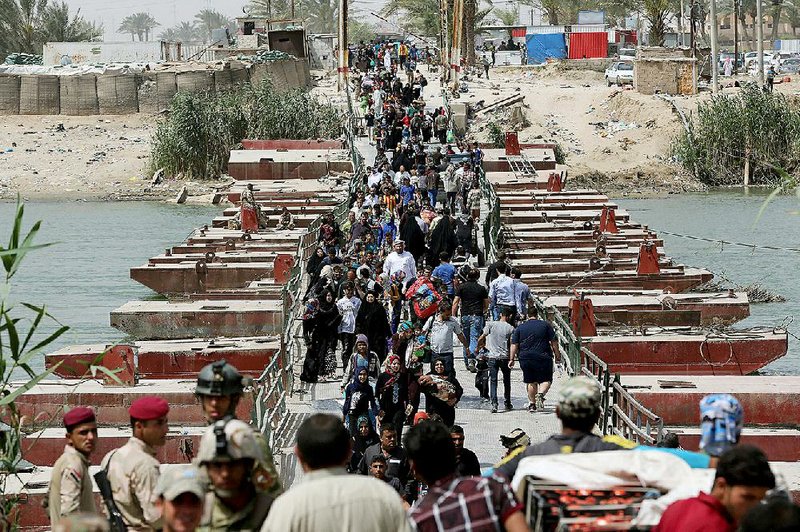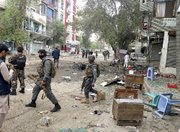FAIZABAD, Afghanistan -- A suicide bomber attacked a line of people waiting outside a bank Saturday in eastern Afghanistan, killing at least 35 and wounding 125 in an assault the country's president blamed on the Islamic State group.
The accusation by President Ashraf Ghani came after local media reports that the Islamic State group's Afghan affiliate had claimed the attack. If true, it would mark an escalation in the extremists' campaign of violence in that country.
While nowhere near as powerful as the Taliban, the affiliate's ability to strike at will indicates a new threat for the country. U.S. and NATO forces ended their combat mission there at the start of the year. The attack also extends the Islamic State group's influence beyond its self-declared caliphate stretching through a third of Iraq and Syria.
The attack in Jalalabad, the capital of eastern Nangarhar province, targeted soldiers and civilians gathered outside the bank to receive their monthly pay.
"The suicide bomber was on foot and wanted to get inside the bank when he detonated his explosives," said Hazrat Hussain Mashreqiwal, the police spokesman for Nangarhar province.
"In the horrific incident in Nangarhar, who took responsibility? The Taliban didn't claim responsibility. Daesh claimed responsibility for it," said Ghani, using an Arabic acronym for the Islamic State.
Ghani did not elaborate on his statement that the Islamic State had taken responsibility for the attack, and it was not clear where he had obtained his information.
Pahjwok News, an Afghan news agency, reported that a former Pakistani Taliban figure named Shahidullah Shahid had said the Islamic State had claimed the attack. But there was no confirmation that Shahid spoke for the group, whose nearest confirmed base of operations is 1,500 miles to the west, in Iraq.
There have been reports of Islamic State recruiting activities in Afghanistan, especially in the southern part of the country. But the bombing Saturday was the first instance of a significant terrorist attack said to be claimed by the group anywhere in eastern Afghanistan. Jalalabad is about 60 miles from the national capital, Kabul.
The Taliban denied that it carried out the bank attack and another elsewhere in the province that killed one civilian and wounded two.
"We condemn/deny involvement in both," Taliban spokesman Zabiullah Mujahid tweeted.
The Islamic State group, currently the target of U.S.-led coalition airstrikes and an Iraqi ground offensive, seized much of Iraq last summer. Its online videos and propaganda, including scenes of mass killings and beheadings, have caught the attention of many extremists.
In Libya, an Islamic State group affiliate has carried out attacks and beheaded 21 Coptic Christians from Egypt. Insurgents in Egypt's strategic Sinai Peninsula also have pledged allegiance to the group, while another purported affiliate in Yemen claimed a series of suicide bombings in March that killed at least 137 people.
Ghani previously had warned that the Islamic State group was starting to establish a presence in Afghanistan. He used his visit to the United States last month to reiterate his concerns.
"If we don't stand on the same line united, these people are going to destroy us," Ghani told about 600 people Saturday in Faizabad, the capital of northeastern Badakhshan province.
He called on the Taliban to join with the Kabul government, saying that any Taliban member who switched allegiance to the Islamic State group would earn the wrath of Afghanistan's religious leaders.
U.S. military officials have expressed alarm about reports of attempts by the Islamic State to capitalize on splits in the Taliban ranks and make inroads in Afghanistan.
Ghani also blamed a recent attack on an army outpost -- in which 18 soldiers were killed, eight of them beheaded -- on "international terrorists." The Taliban aren't known to carry out beheadings.
Ivan Simonovic, the United Nations' assistant secretary-general for human rights, in a visit to Afghanistan, called the attack a "war crime."
"The use of suicide bombs and other devices in such an indiscriminate way by insurgent groups clearly constitutes a war crime, and those responsible for organizing or perpetrating such attacks must be brought to justice," he said in a statement.
Pakistan's prime minister, Nawaz Sharif, responded quickly to reports of the Jalalabad attack.
"Extending condolences on this tragic incident," he said in a news release issued by his office. "Terrorism is a common enemy of both the countries which are now taking joint steps to eradicate this menace."
Analysts and officials say the number of Islamic State supporters in the Afghan-Pakistan region remains small and that the group faces resistance from militants with strong tribal links. Taliban fighters and Islamic State supporters even have battled one another. However, the rise of even a small Islamic State affiliate could further destabilize the region and complicate U.S. and NATO efforts to end the 13-year Afghan war.
Taliban militants in Afghanistan and Pakistan owe their allegiance to Mullah Omar, a cleric who has led the Taliban since the 1990s but has not been seen or heard from in public for years. Officials fear that an Islamic State push into the region could prompt an infusion of guns and money, sparking competition among local militants disenchanted with Mullah Omar's silence and eager to prove themselves by escalating atrocities.
In recent days, Ismail Khan, long a dominant figure in Afghanistan's western province of Herat, said the number of Islamic State supporters is growing because of divisions in Ghani's government. Afghanistan's senior Shiite leader, Mohammad Mohaqiq, said this month that Islamic State loyalists in southern Zabul province also were behind the abduction of 31 ethnic Hazara Shiites in late February.
Last year was the deadliest year of the war for civilians caught up in the Afghan conflict, according to the United Nations. The agency recorded a 22 percent increase in civilian casualties in 2014 over 2013, when the previous record was set. Most of the deaths were attributed to indiscriminate attacks by insurgents.
Also Saturday, Afghanistan's parliament approved 16 Cabinet nominees after months of delays.
Abdul Rauf Ibrahimi, speaker of the parliament's lower house, said the decision means Ghani's 25-member Cabinet is nearly complete. There still hasn't been a defense minister approved by parliament because Ghani and CEO Abdullah Abdullah have disagreed on whom to nominate for the position.
The lack of ministers has caused problems throughout Ghani's government, slowing its work and upsetting many in the country.
There are four women among the newly appointed ministers: Farida Momand at the Higher Education Ministry, Nasreen Oryakhil at the country's Labor Ministry, Dilbar Nazari at the Women's Affairs Ministry and Salamat Azimi at the Counter-Narcotics Ministry.
On Saturday, Iraqi soldiers surrounded and entered that country's biggest oil refinery, which has been besieged for days by Islamic State militants.
Iraqi government forces liberated the Beiji refinery from the Islamic State fighters, state media said Saturday, and military reinforcements reportedly were arriving at the western city of Ramadi.
The refinery, 155 miles north of Baghdad, has been held by the Iraqi military for months, despite the militants' onslaught. Holding it is crucial for the country because it accounts for a little more than a quarter of the country's refining capacity.
Abdel-Wahab al-Saadi, the top military commander in Iraq's Salahuddin province, said ground forces entered the refinery Saturday, days after a number of Islamic State militants carried out a large-scale attack and briefly took over a small part of the sprawling complex.
"It is another victory achieved by Iraqi security forces that are growing confident in the war against the terrorists," al-Saadi said.
A day earlier, Iraqi soldiers, backed by U.S.-led coalition airstrikes, gained control of the towns of al-Malha and al-Mazraah, located 2 miles south of the refinery.
Kurdish peshmerga forces Saturday recaptured two villages just south of the oil-rich city of Kirkuk that lie near the highway linking it to Baghdad, said Rasould Omar, a senior official in the Patriotic Union of Kurdistan.
In separate violence, police said a bombing on a commercial street killed three people and wounded 10 in central Baghdad. A roadside bomb missed a police patrol in the capital's western suburbs, killing one civilian and wounding three, officers said.
Elsewhere, five Australian teenagers were arrested Saturday on suspicion of plotting an Islamic State group-inspired terrorist attack in Melbourne at a Veterans Day ceremony that included targeting police officers, officials said.
The suspects included two 18-year-olds who are alleged to have been preparing an attack at the ANZAC Day ceremony in Melbourne later this month, Australian Federal Police Acting Deputy Commissioner Neil Gaughan told reporters.
Another 18-year-old was arrested on weapons charges, and two other men, ages 18 and 19, were in custody and assisting police. All of the arrests took place in Melbourne.
ANZAC Day is the annual April 25 commemoration of the 1915 Gallipoli landings -- the first major military action fought by the Australian and New Zealand Army Corps during World War I.
Police said they believe the plot was inspired by the Islamic State group and was to have involved "edged weapons."
"At this stage, we have no information that it was a planned beheading. But there was reference to an attack on police," Gaughan said. "Some evidence that we have collected at a couple of the scenes, and some other information we have, leads us to believe that this particular matter was ISIS-inspired."
Information for this article was contributed by Lynne O'Donnell, Rahim Faiez, Jon Gambrell, Kristen Gelineau, Qassim abdul-Sahra, Sameer N. Yacoub and Imad Matti of The Associated Press; by Khalid Alokozay, Rod Nordland, Jawad Sukhanyar and Salman Masood of The New York Times; by Patrick J. McDonnell and Nabih Bulos of the Los Angeles Times; and by Sudarsan Raghavan and Haq Nawaz Khan of The Washington Post.
A Section on 04/19/2015



